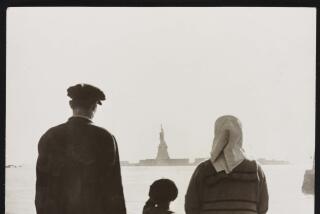Hess Death Closes Chapter on Nazi Epoch, but Book Should Remain Open
With the death of Rudolf Hess, apparently by suicide, Germany comes to the symbolic end of an epoch and the Soviet Union achieves an exorcism. Probably no other nation in the annals of world history has soared to such heights on the spirit of nationalism, then plummeted to such depths in such a short time, before long to be resurrected, with startling success, as the antithesis of its former self.
The core of the Nazi leadership--Hitler, Hess, Goering, Himmler, Goebbels--were all born about 1890 in the heady flush of German power that followed the unification of Germany in the wake of the 1871 victory in the Franco-Prussian War. Germany’s dominance on the European continent fueled the passion of patriotism. And when that dominance was bloodily crushedin World War I, the bitterness was exacerbated by the subsequent economic derangement.
That explains how two such disparate personalities as Hitler--bombastic, mendacious, bellicose--and Hess--introverted, conscientious, uncomfortably pacifist--could find common cause. In fact, of course, they complemented each other: Hitler the leader, Hess the secretary. While Hitler manipulated the German people and encouraged the flourishing corruption in the party, Hess, scrupulously honest, served as ombudsman and was known as “the conscience of the party.” The political ties that united them were loosened by the outbreak of the war--a war that, by and large, the German people, and Hess as their representative, had little enthusiasm for--and stretched to the breaking point by Hitler’s decision to attack the Soviet Union, even though emotionally Hess remained bonded to Hitler until the end.
To place Hess’ quixotic peace flight to Scotland in May, 1941, in its proper perspective, one needs to understand Hitler’s rationale for turning against the Stalin regime that was at the time his close ally. The true reason was that Hitler could see no other way of extricating Germany from its chronic economic dependency and thwarting the Soviets’ own territorial ambitions. But the rationalization that he presented to his inner circle was that there must be a secret British-Soviet pact: “No further doubt is possible,” he said. “England is hoping for this final sword thrust against us on the continent, else she would have stopped the war after Dunkirk. Private or secret agreements have certainly been made.” Distorted as his thinking might seem, Hitler argued that Britain could be induced to make peace only if the Soviet Union were crushed first.
But neither the preponderance of German generals nor that of Nazi Party members had much stomach for starting a new war against the Soviet Union. Basking in the halcyon days of the decimation of France and the greatest German victory of all time, they wished to avoid above all a replication of the slaughterhouse of World War I. The evidence seems to indicate that Hess, sensitive to popular opinion, tried to initiate peace negotiations with Britain not so much for the purpose of giving Hitler a free hand againstthe Soviets, but to forestall the attack. With peace achieved, Hitler’s declared reason for invading the Soviet Union would have evaporated. Consequently, Hitler denounced Hess as a madman and a traitor.
Hess, already on the far side of eccentricity, never recovered from the break. Shortly after his arrival in England he attempted suicide by leaping over a banister, and turned into a paranoid hypochondriac who believed that he was being poisoned. The transcripts of his private conversations and interrogations at Nuremberg are ludicrous and sometimes hilarious, and in his one public statement at the trial he ascribed the atrocities to the mass infiltration of German minds, including the Fuehrer’s, by mysterious, mesmeric forces.
What the Soviets could never forgive Hess for, and which led to their insistence on keeping him locked up in Spandau Prison until the end, was that his counsel, Alfred Seidl, succeeded in uncovering and introducing at the Nuremberg trial the secret 1939 protocols between Hitler and Stalin, which divided Eastern Europe between them. These were the most concrete and damning evidence of Stalin’s duplicity, and, besides the general embarrassment they produced, came at a most awkward time, when the Soviets were in the process of establishing their hegemony over Eastern Europe in the guise of liberators.
So it was, in the most ironic of denouements, that Hitler, who cast himself as the protector of Europe against the menace of communism, drew the Soviets into the heart of Europe and precipitated a division of Germany that he would have equated with national perdition. Yet, liberated from the straitjacket of militarism, Germany was able for the first time to direct its full ingenuity and energy toward peaceful purposes. The Volkswagen, which Hess and other of the more consumer-oriented Nazi leaders had sponsored as a people’s car but which had been aborted by the war, became, in terms of numbers, the most successful automobile in history. Germany, utterly defeated and shattered by war, has succeeded through peaceful pursuit in creating a prosperity that it could never achieve through perfervid nationalism and aggression.
The death of Hess--who certainly shared many of Hitler’s crackpot ideas, including his anti-Semitism, if not his ruthlessness and love of war--should remind us of that. For though the chronicle of Nazi personalities may now be considered complete, it is important that the book of their errors, unique in both extent and depth, remain open for everyone to read for all time.
More to Read
Sign up for our Book Club newsletter
Get the latest news, events and more from the Los Angeles Times Book Club, and help us get L.A. reading and talking.
You may occasionally receive promotional content from the Los Angeles Times.







